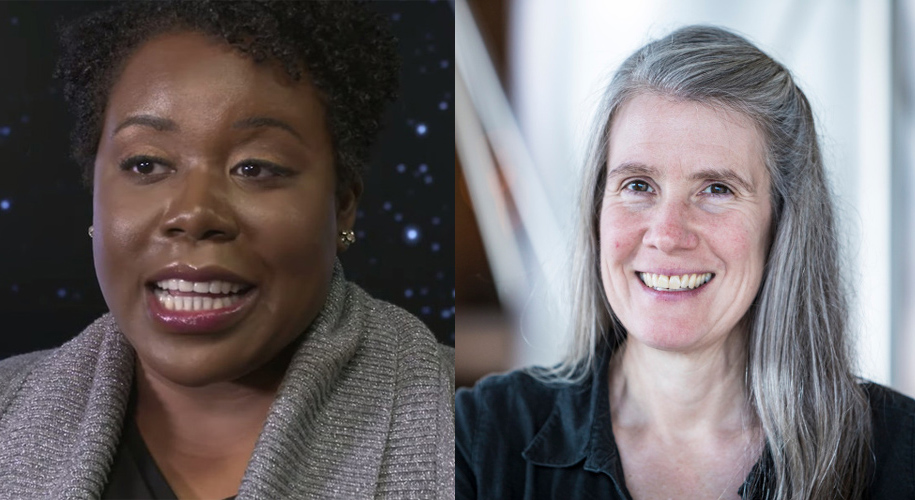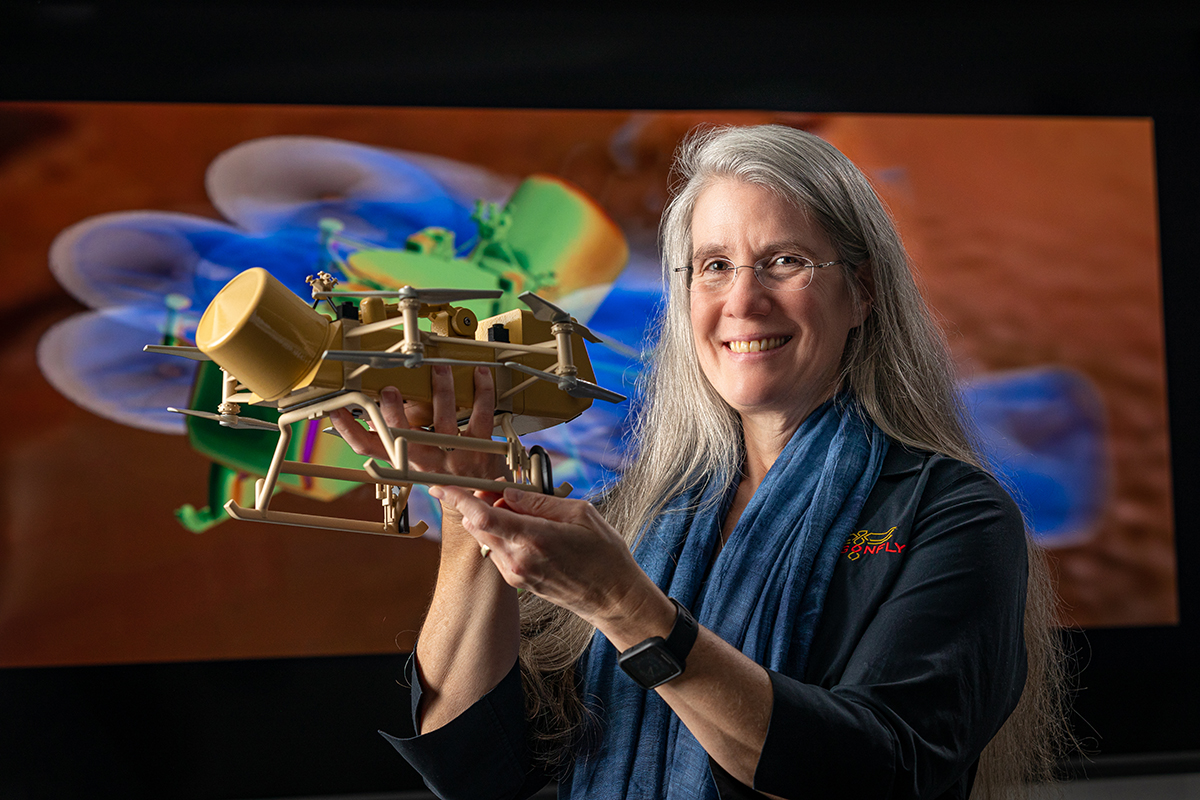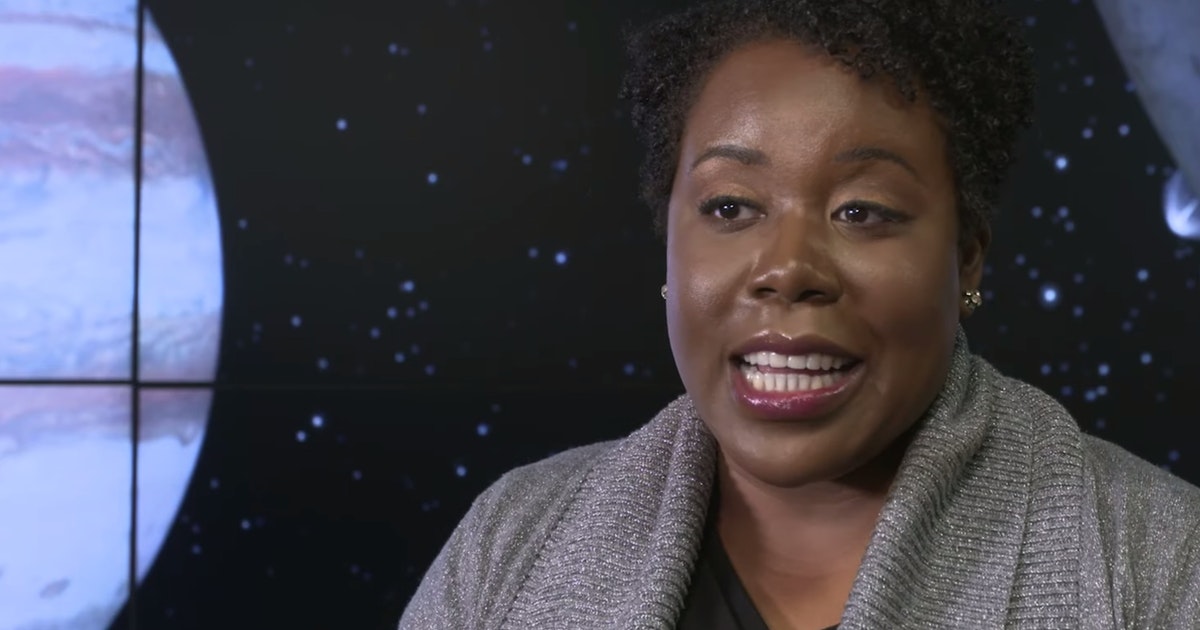August 27, 2021
Dragonfly Team Members Earn American Astronomical Society Honors

The American Astronomical Society's Division for Planetary Sciences recently recognized the career contributions of Dragonfly mission team members Zibi Turtle and Lynnae Quick.

Zibi Turtle (Credit: Johns Hopkins APL/Ed Whitman)
Turtle, Dragonfly principal investigator and a planetary scientist at the Johns Hopkins Applied Physics Laboratory (APL), was awarded the inaugural Claudia J. Alexander Prize, which recognizes outstanding contributions by a mid-career scientist. Quick, a Dragonfly co-investigator and research scientist in planetary studies at NASA's Goddard Space Flight Center, received the 2021 Harold C. Urey Prize for outstanding achievement in planetary research by an early-career scientist.
Turtle's award honors Claudia Alexander, a gifted scientist and science communicator who, in addition to contributing significantly to missions to comets, Jupiter and Saturn, worked tirelessly to promote representation of women and minorities in the field. She died in 2015 at age 56.
"I looked up to Claudia as a colleague and a friend, so receiving the first award in her honor is very special," said Turtle. "I'm humbled to be recognized for the standards and ideals she stood for, and for the inspiration she provided to the next generation of planetary scientists and explorers."
Turtle's own research contributes to better understanding geophysical processes and features on planetary surfaces across the solar system. She played an integral role in analyzing and interpreting images from the Galileo and Cassini missions, building an intimate understanding of the mechanisms that shape the surfaces of moons such as Io, Europa and Titan.
DPS lauded Turtle's leadership in the field and dedication to public outreach and engagement well beyond the scientific community. It also cited Turtle's 2011 paper in the journal Science, "Rapid and Extensive Surface Changes Near Titan's Equator: Evidence of April Showers," for its creative approach of synthesizing data from three instruments on Cassini to tell a captivating story about an infrequent rain shower in Titan's equatorial region.
Turtle will build exponentially on that body of knowledge as principal investigator of the Dragonfly mission to Titan, a revolutionary approach to exploration that in 2027 will send a rotorcraft lander to the exotic, organic moon of Saturn. She also leads the Europa Imaging System, the sophisticated camera on NASA's upcoming Europa Clipper mission that will deliver the most detailed images yet of Jupiter's large icy moon.

Lynnae Quick (Credit: NASA)
The Urey award cited Quick's innovative scientific work that focuses on geophysical processes writ large, reaching from the inner solar system, through the asteroid belt, to ocean worlds, and into the exoplanetary realm.
She has made significant contributions to the study of cryovolcanism as a process on dwarf planets Ceres, including the formation of the enigmatic faculae or "bright spots," in which she was the first to model the movement of material from a deep brine reservoir in Ceres' interior to its emplacement via eruptions at the surface. Quick has revisited modeling of (cryo)lava domes on Venus and Europa and has repeatedly provided new insights into detection requirements for plumes and their associated eruption products on Jupiter's moon Europa. She has placed constraints on the propensity for volcanism on extrasolar planets, and found that a significant number of extrasolar planets may indeed be ocean worlds. Asteroid 37349 was recently named Lynnaequick in her honor.
In addition to her scientific pursuits, Quick is exceptionally engaged in the broader research community through her proactive leadership in space missions. This includes her work as a co-investigator on missions such as Europa Clipper and Dragonfly; as a member of the Outer Planets Assessment Group steering committee; a member of the Planetary Science Decadal Survey 2023-2032 panel on ocean worlds and dwarf planets; and as co-chair of the Earth and Planetary Systems Sciences section of the National Society of Black Physicists.
"I am honored to receive the Harold C. Urey prize, especially during such a fantastic time of discovery and exploration in planetary science," Quick said. "I look forward to many more years of scholarship and service."
The 2021 DPS prizes will be presented at the 53rd annual meeting of the Division for Planetary Sciences, which will take place virtually from Oct. 3-8, 2021.
Learn more about Zibi Turtle:
Learn more about Lynnae Quick:
Research Feature: Are Planets with Oceans Common in the Galaxy? It's Likely, NASA Scientists Find
Compiled from Johns Hopkins APL and NASA Goddard Space Flight Center news releases.


